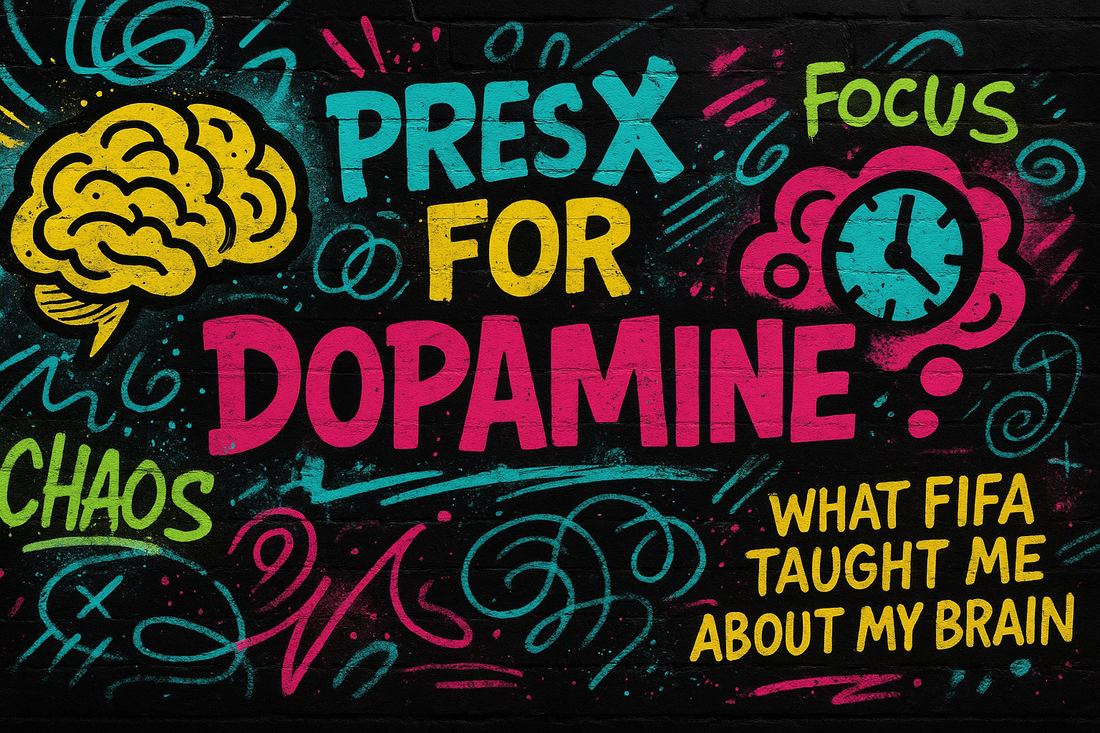
Press X For Dopamine_ What Fifa Taught Me About My Brain
Share
Ever found yourself lost in a video game when life feels too boring or challenging? You’re not alone. This podcast episode dives into how video games stimulate the neurodivergent brain, especially in adults with ADHD or dyslexia. It also looks at what happens to our dopamine levels when we play and how we can keep a healthy balance between gaming and real-life responsibilities.
Stephen Martin breaks down why many of us crave the excitement and quick satisfaction of a game. He explains how games serve as a reachable dopamine boost, something that’s often missing from everyday tasks. Yet he also shares strategies to avoid falling into the trap of gaming as an escape, encouraging listeners to treat it as a mindful hobby instead.
The Power of Dopamine
Ever notice how much easier it is to focus on a game than on chores? This is all about dopamine, the tiny chemical messenger that lights up our brain’s pleasure centres. Neurodivergent minds might feel starved for dopamine when doing mundane tasks like folding laundry or paying bills.
When we play a game, we get a predictable chain of rewards: we tackle a challenge, we get a power-up, we see our score go higher. That feedback loop keeps us hooked. Adventures that might seem too long or draining in real life become enjoyable in a game because dopamine is readily on tap.
Why Real Life Lacks That Instant Gratification
In real life, we don’t always get bright lights or big wins. Our efforts can feel invisible, especially if you have ADHD or dyslexia. You might work hard on a project but lack immediate results. This can dampen motivation, making it tempting to retreat to something that feels more achievable: beating a game level.
Delayed rewards often fail to excite the same parts of the neurodivergent brain. Without immediate milestones, our heads can wander. That’s why it’s worth creating mini goals in daily life, like celebrating small achievements or tracking “visible wins.” Even simple checklists can work wonders for boosting our sense of progress.
Mindful Play vs. Escapism
Gaming can be wonderful for stress relief, creativity, and connection with friends. But it’s slippery ground if we use it to flee from obligations. Setting some guidelines can make all the difference: turn off notifications for aimless scrolling and schedule specific play times. That way, gaming feels more like an intentional break rather than a total escape.
“We need to treat gaming as a form of play, not an escape, so we can keep it healthy.”
This quote from the episode hits home because it reminds us that a mindful approach can help us avoid addictive patterns. By noticing how much time we’re investing in games, and being aware of why we’re playing, we keep control over the habit.
Creating Healthy Dopamine Loops
Think about what’s actually happening when you power up a game. You set a target, like slaying a dragon or solving a puzzle. Then you get instant feedback and a reward, like levelling up or seeing a new cutscene. This loop satisfies the craving for immediate recognition.
In daily life, it’s trickier to replicate such loops. However, you can create systems to track achievements. Some people mark daily goals in a journal. Others get creative by adding star stickers to bigger tasks. This might feel childlike, but it works. You physically see your progress. Feeling like you’re levelling up in real life can keep you well motivated.
It also helps to remember that not every moment needs to be entertaining. Boredom gives the brain time to rest and reflect. When you allow a bit of quiet, you’re more appreciative of the times you do lean into active fun or gaming. Balancing play with downtime can boost creativity and reduce reliance on external stimulation.
- Observe when and why you’re drawn to gaming.
- Set boundaries to keep gaming sessions in check.
- Add playful tools like checklists or star charts to daily tasks.
- Experiment with boredom to reconnect with simple joys.
Takeaways
- Video games can be therapeutic for neurodivergent brains.
- Dopamine is key in boosting motivation and pleasure.
- Real life lacks obvious reward loops, so it’s vital to create your own.
- Transactional thinking can rob us of satisfaction in daily tasks.
- Mindfulness in gaming can prevent addiction and encourage creativity.
- Visible wins are a powerful way to track progress in real life.
- Scheduling boredom helps us appreciate life’s smaller moments.
- Setting gaming limits can keep your daily routine balanced.
Ready to hear more? The full episode is right at the top of this page, waiting to be played. Tune in for practical tips, real-life stories, and a deeper look at balancing video games with all the responsibilities of being an adult with dyslexia or ADHD. If you want to learn more, check out truthaboutdyslexia.com and have a peek at rightbrainresetters.com to support the podcast and unlock extra resources.

